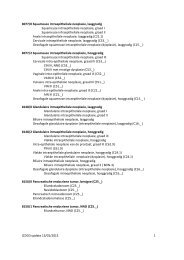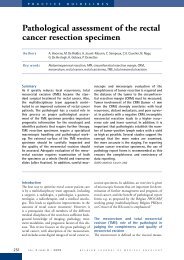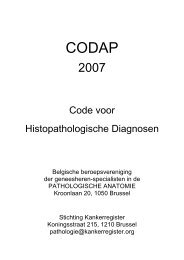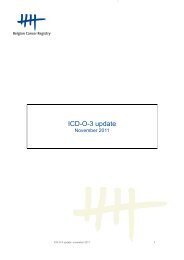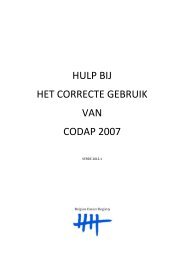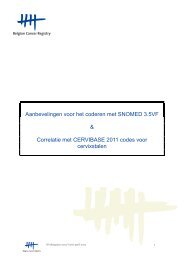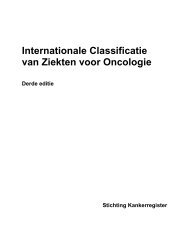Assurance de qualité pour le cancer rectal – phase 2 ...
Assurance de qualité pour le cancer rectal – phase 2 ...
Assurance de qualité pour le cancer rectal – phase 2 ...
You also want an ePaper? Increase the reach of your titles
YUMPU automatically turns print PDFs into web optimized ePapers that Google loves.
KCE Reports 81 PROCARE <strong>–</strong> Phase 2 774.3.2 Availability of PROCARE quality indicators in Western EuropeandatabasesIn chapter 2, quality of care indicators for the management of patients with <strong>rectal</strong><strong>cancer</strong> have been i<strong>de</strong>ntified. It was explored whether these QI could be compared withdata from other Western European <strong>rectal</strong> <strong>cancer</strong> databases. In view of theircharacteristics (cfr. supra), the results from Denmark, Norway, Swe<strong>de</strong>n and the UK areof most interest (see appendix).It appears that benchmarking with the national and compulsory registries from Norwayand Swe<strong>de</strong>n have the best potential to be explored. The Norwegian registry remarkedthat neoadjuvant short course radiotherapy as well as adjuvant chemotherapy is not(routinely) used in Norway, in contrast to Swe<strong>de</strong>n. Also, the quality of TME is notregistered in Norway. Data from the Danish registry do not allow benchmarking fordisease-free survival and use of neoadjuvant or adjuvant therapy. Data from the UKwould not allow stratification of patients according to the <strong>le</strong>vel/location of <strong>rectal</strong> <strong>cancer</strong>.Most of the other QI are ab<strong>le</strong> to be compared, although some only on subsets ofpatients.The following additional information was provi<strong>de</strong>d at the occasion of the abovementioned questionnaire:4.3.2.1 DenmarkUntil now, the Danish Colo<strong>rectal</strong> Cancer Database has been a surgical-based databasewith only basic radiological, pathological and oncological data. However, they are in theprocess of extending the database with data re<strong>le</strong>vant to the PROCARE project.4.3.2.2 The NetherlandsA nationwi<strong>de</strong> specific database on <strong>rectal</strong> <strong>cancer</strong> is not instal<strong>le</strong>d. At this moment, onlydata on <strong>rectal</strong> <strong>cancer</strong> patients in randomized trials and limited data from retrospectiveanalyses in <strong>rectal</strong> <strong>cancer</strong> are availab<strong>le</strong>. As of January 1st 2008, prospective dataregistration on colo<strong>rectal</strong> <strong>cancer</strong> has started in 2 regions, eventually to cover the entirecountry (cfr. infra). It was proposed to the new ECCO organisational board to set up aEuropean structure preferably also including the PROCARE study (Van <strong>de</strong> Vel<strong>de</strong> C.,February 2008, personal communication).The contacted persons also confirmed and specified that their regional <strong>cancer</strong> registryof the Northern Netherlands does only allow for a limited analysis of treatment quality,i.e. only for some main indicators of comp<strong>le</strong>teness of treatment. In the last <strong>de</strong>ca<strong>de</strong> twolarge documentation studies were performed which allow for more in <strong>de</strong>pth analysis.The first and most extensive study was started in 1994, and is likely of limited interestfor current quality of <strong>rectal</strong> <strong>cancer</strong> care. The second study concerns patients diagnosedand treated between 2001 and 2004 and might be more re<strong>le</strong>vant for this project.4.3.2.3 United KingdomThere are 8 regional <strong>cancer</strong> registries in England. Each registry col<strong>le</strong>cts data on all<strong>cancer</strong>s diagnosed in the country and NYCRIS covers the Northern and Yorkshireregions. Each registry records the diagnosis of all <strong>cancer</strong>s, but they also col<strong>le</strong>ct varyingamounts of additional information on treatment and stage. The national data registeredat NYCRIS are specific to colo<strong>rectal</strong> <strong>cancer</strong>. Colo<strong>rectal</strong> <strong>cancer</strong> specialists have lookedat patterns of care across the country in the respective databases for colo<strong>rectal</strong> <strong>cancer</strong>.To do so, extracts of colo<strong>rectal</strong> <strong>cancer</strong> data were taken from each <strong>cancer</strong> registry andpoo<strong>le</strong>d to form a national dataset. Currently, the data set covers the period of 1996 <strong>–</strong>2005 and incorporates information on about 300.000 patients. However, because of thevarying amounts of treatment information availab<strong>le</strong> in the different registries, patterns ofpractice in some areas of the country could not really be distinguished using the registrydata alone. Therefore, these data have been linked to a dataset known as hospita<strong>le</strong>piso<strong>de</strong> statistics which holds information about every inpatient stay in an NHS hospital.This gives information about all treatments that require a stay in an NHS hospital.



